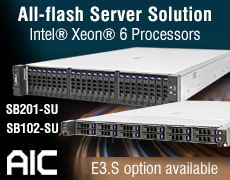Axiom Space, Spacebilt Announce Orbital Data Center Node Aboard International Space Station
Axiom and Spacebilt to establish ISS data center node
This is a Press Release edited by StorageNewsletter.com on September 30, 2025 at 2:00 pmAxiom Space Inc. and Spacebilt Inc. announced a multi-organization collaboration to bring optically-interconnected orbital datacenter (ODC) infrastructure to the International Space Station (ISS) in 2027.
![]()
![]()
The Axiom Orbital Data Center Node on the International Space Station, (AxODC Node ISS), developed under a collaboration agreement with Spacebilt, and supported with an Optical Communication Terminal (OCT) by Skyloom, and hardware by Phison Electronics and Microchip Technology, will establish an optically interconnected, high-performance ODC node aboard the station enabling satellites, other spacecraft in low-Earth orbit (LEO), and astronauts and researchers to store and process data, and run Artificial Intelligence and Machine Learning (AI/ML) workloads and other cloud computing applications. This evolution builds upon the achievement of launching the Axiom Data Center Unit One (AxDCU-1) to the space station in August, a progressive step in Axiom Space’s initiative to continue the proliferation of ODC nodes, and in alignment with the announcement in April by Axiom Space to launch AxODC Nodes 1 and 2 NET late 2025.
“The Axiom Space team has been deploying and operating cloud computing capabilities on the space station since 2022,” said Jason Aspiotis, global director of in-space data and security, Axiom Space. “AxODC Node ISS is particularly exciting because not only are we increasing computing capacity on the space station, but we are integrating commercial optical communications terminals with the station which gives our computing hardware connectivity to satellites in the mesh network. This is part of our roadmap for a distributed and federated network of ODC nodes, steadily increasing storage and processing capacity available to national security, civil, commercial and international clients anywhere in LEO. By 2027, we plan to have at least three ODC nodes, interconnected and interoperable with each other, and provide services to any satellite and spacecraft with compatible OCTs.”
Spacebilt is leading the engineering design effort and the implementation of the internal and external payloads. Additionally, Spacebilt is delivering its Large In-Space Servers (LiSS), representing the first deployment of petabyte-class servers in space with Phison Pascari enterprise class solid-state drives (SSDs), along with Microchip Technology’s PIC64 High-Performance Spaceflight Computing (PIC64-HPSC), providing the servers and the AxDCU-1 networked access to OCTs installed on the outside of the station.
“Spacebilt Inc. provided the world’s first lunar data server for a commercial customer in 2025 as well as compute infrastructure for the station’s external payloads,” said Dennis Wingo, president and CTO, Spacebilt. “This collaboration with Axiom Space,and the support from Microchip Technology for the first flight of the NASA co-funded PIC64-HPSC, and the first LEO flight of Pascari enterprise 122.88 terabyte SSDs from Phison Electronics, brings a new era in compute and storage in space.”
Phison Electronics is supplying Phison Pascari enterprise-grade SSDs that will deliver over one petabyte of storage to the AxODC Node ISS. This will represent the second spaceflight of Phison’s Pascari enterprise SSDs following a lunar landing earlier this year.
“We are committed to enabling storage in space as the next data frontier,” K.S. Pua, CEO and founder, Phison Electronics. “To support this launch and bring unmatched, petabyte-level storage capacity in an ODC environment, Phison is providing Pascari enterprise SSDs as the foundation for the AxODC Node aboard the International Space Station. Pascari delivers petabyte-class storage, tested for the harsh environments in space and primed to travel to low-Earth orbit for the first time. This milestone demonstrates how our innovations in high-performance storage are extending beyond data centers on Earth to enable the next era of space-based computing and AI.”
Microchip Technology is providing multiple components in LiSS, including a PCIe Gen5 switch, PolarFire SoC, and the PIC64-HPSC, a next-gen microprocessor designed for high-reliability compute in space environments. The HPSC will serve as the core controller and workload central processing unit routing high-data-rate communications from the laser systems while also powering and managing the servers.
“Microchip’s PIC64-HPSC processors, developed in partnership with NASA’s Jet Propulsion Laboratory, are setting a new standard for space-based computing by bringing AI/ML acceleration and robust Ethernet-based, time-sensitive networking to the intelligent edge,” said Kevin So, VP, communication business unit, Microchip Technology. “By collaborating with space infrastructure pioneers Axiom Space and Spacebilt, we are helping to shape the foundation for next-gen orbital data centers. This milestone underscores Microchip’s commitment to advancing the PIC64-HPSC platform as a catalyst for innovation across the rapidly expanding new-space ecosystem.”
Skyloom is providing one Space Development Agency (SDA) Tranche 1-compatible commercial OCT, enabling up to 2.5 Gbps of connectivity between satellites in LEO and the AxODC Node ISS. This is the first step towards future 100 Gbps connectivity, which will also provide Axiom Space, Spacebilt, and their commercial customers with telco-grade, high-data-rate, low-latency communications access for transporting data from space back to the ground.
“We are laying the foundation for an optical backbone that will one day make space as connected and data-rich as Earth,” said Eric Moltzau, CCO, Skyloom. “By enabling high-speed optical links to the AxODC Node, we’re accelerating the future of orbital cloud computing and AI-driven decision-making in space.”
This cooperation represents the future of ODC infrastructure and orbital cloud services in LEO. Terrestrial cloud infrastructure is interconnected and accessible anywhere in the world, and supported by an ecosystem of cloud service providers, data center builders, computing hardware vendors, and fiber cable network providers. Orbital cloud infrastructure will continue to evolve as an ecosystem of space platform providers, LEO-hardened computing hardware vendors, and optical communications relays. Axiom Space believes there is a tremendous opportunity for companies around the world to collaborate and unlock the future of space-based cloud and AI.










 Subscribe to our free daily newsletter
Subscribe to our free daily newsletter


